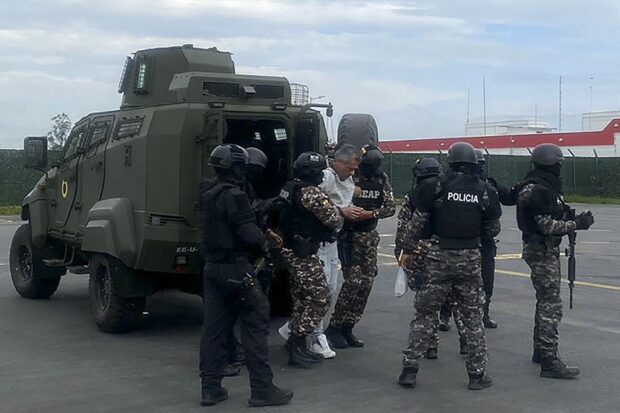What fallout awaits Ecuador after raiding Mexico embassy?

This handout picture released by the Ecuadorian Police shows former Ecuadorian vice president Jorge Glas (C) being escorted by members of the police prior to his transfer to the maximum security prison La Roca in Guayaquil at the Mariscal Sucre International Airport in Quito on April 6, 2024. Ecuadorian authorities stormed the Mexican embassy in Quito on April 5 to arrest former vice president Jorge Glas, who had been granted political asylum there, prompting Mexico to sever diplomatic ties after the “violation of international law”. (Photo by Handout / Ecuadorian Police / AFP)
Mexico City, Mexico — Ecuador’s raid on the Mexican embassy in Quito unleashed a storm of international criticism and a vow by Mexico to file a complaint with the International Court of Justice (ICJ).
AFP asked experts what consequences they expect for the Ecuadoran government from the incident.
What are the likely legal and economic ramifications?
Mexico said it planned to take its case against Ecuador to the ICJ on Monday.
According to Esteban Nicholls, director of Latin American studies at Ecuador’s Simon Bolivar Andean University, “one of two things” is likely from the international court.
They include a fine or removing Ecuador or its votes from multilateral bodies such as the Organization of American States, he said.
READ: Ecuador raid a blow to Mexico’s ‘sacred’ asylum tradition
Quito’s security forces stormed the Mexican embassy to capture fugitive former vice president Jorge Glas, who took refuge inside to avoid arrest for alleged corruption.
Ecuador “will argue that the Mexican embassy sheltered an ordinary prisoner, not someone who is politically persecuted. International law does not allow an ordinary criminal to take refuge in an embassy,” Nicholls said.
Even so, “the court will surely rule against Ecuador because invading an embassy is — at least under international law — invading another country,” he added.
The embassy raid has already brought economic repercussions: Mexico said its negotiations with Ecuador on a free trade deal, a requirement for joining the Pacific Alliance trade bloc, were put on hold.
What is the diplomatic fallout?
Searing rebukes poured in from regional governments across the political spectrum, including Argentina, Brazil, Chile, Colombia, Cuba, Peru and Venezuela, as well as farther afield.
Bolivia withdrew its ambassador from Quito.
Nicaragua went further and broke off diplomatic relations with Ecuador, following the lead of Mexico, which withdrew its diplomatic personnel.
“The breaking of relations with Mexico is no small punishment. It’s a country with a lot of weight in the region,” said Michel Levi, professor of international studies at the Simon Bolivar Andean University.
“Withdrawing all diplomatic personnel without even leaving any consular service is already a quite radical measure” by Mexico, added the expert in international law.
Roberto Beltran, a professor of conflict management at Ecuador’s Private Technical University of Loja, described the rupture as “dangerous” and warned it could hinder cooperation on combating drug trafficking.
What are the domestic repercussions?
Despite the international criticism, Ecuadoran President Daniel Noboa “has strengthened himself” on the domestic political stage, according to Levi.
The self-proclaimed center-left politician, who supported in congress by the right, has portrayed the raid as part of his “fight against impunity,” he noted.
Glas, who was granted asylum by Mexico on Friday, is “a symbol of corruption in Ecuador,” Nicholls said.
The former vice president was released from prison in November 2022 after serving time for corruption in a vast scandal involving the Brazilian construction giant Odebrecht.
Last year, former Ecuadoran transport minister Maria de los Angeles Duarte, who had been sentenced to eight years in prison for bribery, escaped to Venezuela after more than a year of living in the Argentine embassy in Quito.
The episode caused a diplomatic row between the then president of Ecuador, Guillermo Lasso, and Buenos Aires.
Noboa, 36, has now portrayed himself “as a very strong leader,” Beltran said, ahead of a referendum on April 21 on whether to take tougher measures against crime.